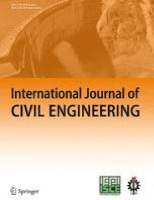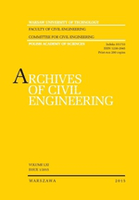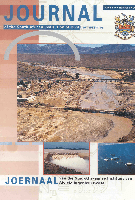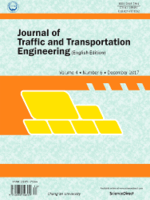
CIVIL ENGINEERING
Scope & Guideline
Fostering Excellence in Civil Engineering Research
Introduction
Aims and Scopes
- Structural Engineering:
Focuses on the analysis, design, and performance evaluation of structures including buildings, bridges, and dams, with an emphasis on seismic resilience and innovative materials. - Transportation Engineering:
Covers topics related to traffic flow, road safety, and the optimization of transportation systems, integrating advancements in AI and data analytics for improved infrastructure management. - Environmental Engineering:
Addresses issues such as water quality, waste management, and the impact of climate change on civil infrastructure, promoting sustainable solutions for environmental challenges. - Geotechnical Engineering:
Explores soil-structure interactions, foundation design, and the behavior of materials under load, with studies often focusing on innovative materials and methods. - Construction Management:
Includes research on project delivery methods, risk assessment, and the optimization of construction processes, highlighting the role of technology in enhancing productivity and safety. - Materials Engineering:
Investigates the properties and applications of construction materials, including the use of recycled and sustainable materials, alongside advancements in material science.
Trending and Emerging
- Sustainable Construction Practices:
Increasing attention is being paid to sustainable materials and practices, with research exploring the use of recycled materials and environmentally friendly construction techniques. - Smart Infrastructure and IoT:
The integration of Internet of Things (IoT) technologies into civil engineering is gaining prominence, with studies examining smart sensors and data analytics for infrastructure monitoring and management. - Climate Resilience and Adaptation:
Research focusing on the resilience of infrastructure to climate change impacts, including flooding and extreme weather events, is becoming increasingly relevant as environmental concerns grow. - Advanced Data Analytics in Engineering:
The use of machine learning and AI for predictive analytics, condition monitoring, and optimization in civil engineering practices is emerging as a significant area of interest. - BIM and Digital Construction Technologies:
Building Information Modeling (BIM) and other digital technologies are increasingly being explored for their role in enhancing project efficiency, collaboration, and lifecycle management. - Innovative Materials and Technologies:
Research into new construction materials, including nanomaterials and bio-based materials, is trending, reflecting a shift towards innovation in material science.
Declining or Waning
- Traditional Construction Techniques:
There is a noticeable reduction in research focused on conventional construction methods as newer, more innovative techniques and materials gain traction in the field. - Basic Infrastructure Maintenance:
Research specifically dedicated to conventional maintenance practices has diminished, likely due to the industry's shift towards more advanced predictive maintenance technologies and data-driven management. - Non-automated Traffic Management:
Studies related to traditional traffic management systems have decreased in favor of research exploring automated and smart traffic systems, reflecting evolving transportation technology. - Static Structural Analysis:
The emphasis on basic static analysis methods has waned as more complex and dynamic modeling approaches become standard in structural engineering research. - Purely Theoretical Studies:
There is a decline in the publication of papers that focus solely on theoretical frameworks without practical applications, as the journal increasingly favors applied research that demonstrates real-world relevance.
Similar Journals

Innovative Infrastructure Solutions
Empowering Tomorrow's Infrastructure Innovations.Innovative Infrastructure Solutions is a leading academic journal published by Springer International Publishing AG, focusing on pioneering advancements in the fields of building and construction, civil and structural engineering, and environmental engineering. With an impact factor that reflects its significant role in the academic community, this journal serves as a vital platform for researchers, professionals, and students to disseminate groundbreaking studies and novel methodologies spanning diverse engineering disciplines. Since its inception in 2016, Innovative Infrastructure Solutions has steadily positioned itself within the Q2 category across several fields, including geotechnical engineering and engineering geology, as recognized in the 2023 quartiles. This reputable journal, accessible from Switzerland, not only emphasizes collaboration and knowledge exchange but also empowers innovators in infrastructure development globally. Whether you're contributing to a research project or seeking the latest findings, Innovative Infrastructure Solutions remains essential for anyone invested in advancing sustainable infrastructure solutions.

Civil Engineering Infrastructures Journal-CEIJ
Empowering engineers with impactful research insights.Civil Engineering Infrastructures Journal (CEIJ), published by the University of Tehran, College of Engineering, is a premier platform dedicated to advancing the field of civil and structural engineering. With an ISSN of 2322-2093 and an E-ISSN of 2423-6691, CEIJ has been an Open Access journal since 2013, ensuring that critical research is accessible to a global audience. While it currently holds a Q4 category ranking in Civil and Structural Engineering as per the 2023 quartiles, the journal is committed to enhancing its reputation and impact within the academic community. Researchers, professionals, and students will find valuable insights in its compelling articles, which cover a wide array of topics pertinent to civil engineering infrastructures. The journal aims to foster innovative ideas and solutions that address contemporary challenges in the industry. As a publication rooted in Iran but reaching an international readership, CEIJ serves as a significant conduit for disseminating impactful research in the ever-evolving landscape of civil engineering.

International Journal of Civil Engineering
Innovating Today for a Resilient TomorrowThe International Journal of Civil Engineering, published by Springer International Publishing AG, is a premier platform dedicated to advancing the field of civil engineering. With a notable impact factor and a strong reputation reflected in its Q2 quartile rankings in both Civil and Structural Engineering as well as Geotechnical Engineering and Engineering Geology, this journal facilitates the dissemination of high-quality research from 2009 through 2024. Researchers and professionals can access cutting-edge studies and innovative practices that address contemporary challenges in civil engineering, such as sustainable infrastructure development, environmental impacts, and advanced material technologies. Situated in Switzerland, the International Journal of Civil Engineering emphasizes the critical interplay between theory and application, making it an essential resource for students, academics, and industry leaders seeking to stay at the forefront of their disciplines.

Civil Engineering Journal-Stavebni Obzor
Connecting Ideas, Building TomorrowWelcome to the Civil Engineering Journal-Stavebni Obzor, an esteemed academic publication dedicated to advancing the field of civil engineering. Published by the Czech Technical University in Prague, Faculty of Civil Engineering, this journal has provided a platform for innovative research and critical discourse since its inception. With an ISSN of 1210-4027 and an E-ISSN of 1805-2576, this Open Access journal has been facilitating wide dissemination of knowledge in civil engineering since 2014, ensuring that valuable research reaches a global audience without barriers. The journal is committed to fostering collaboration among researchers, professionals, and students, encouraging the exchange of ideas that drive the discipline forward. Its diverse scope encompasses various aspects of civil engineering, making it an essential resource for anyone looking to stay at the forefront of this dynamic field. Located in Prague, a hub of engineering excellence, this journal not only reflects the latest trends and innovations but also contributes to shaping the future of civil engineering.

Infrastructures
Bridging Theory and Practice in Building and ConstructionInfrastructures is a distinguished open-access journal, published by MDPI since 2016, dedicated to advancing the fields of engineering and construction through interdisciplinary research and critical insights. Based in Switzerland, it serves a global community of scholars and professionals, providing a platform for innovative studies that drive progress in Building and Construction, Civil and Structural Engineering, Computer Science Applications, Geotechnical Engineering and Engineering Geology, and various aspects of Materials Science. With an impressive impact factor and a positioning in the Q2 category across multiple engineering fields, the journal's robust ranking reflects its commitment to high-quality research, with notable Scopus rankings showcasing its significant contribution to academic discourse. Infrastructures not only facilitates open access to essential knowledge but also aims to bridge the gap between theory and practical application, making it an invaluable resource for researchers, industry professionals, and students alike.

Archives of Civil Engineering
Championing Excellence in Structural InnovationArchives of Civil Engineering is a premier academic journal published by POLISH ACAD SCIENCES, dedicated to advancing the field of civil and structural engineering. Established in 1996, this open-access journal has been pivotal in disseminating high-quality research and innovation in engineering practices, particularly since adopting open access in 2010. With an ISSN of 1230-2945 and E-ISSN of 2300-3103, it enjoys a notable reputation, currently ranked in Q3 of the Civil and Structural Engineering category for 2023, reflecting its considerable contribution to scholarly content in the discipline. The journal caters to a diverse audience of researchers, professionals, and students, providing them with a platform to share and access essential findings. Its commitment to high academic standards is underscored by its ranking in Scopus, where it stands at Rank #265/379. Located in Warsaw, Poland, the journal aims to promote international collaboration and foster knowledge exchange in civil engineering, making it an indispensable resource for anyone involved in this dynamic field.

Journal of the South African Institution of Civil Engineering
Innovating the future of South African infrastructure.Journal of the South African Institution of Civil Engineering (ISSN: 1021-2019) is a distinguished open-access publication dedicated to advancing the field of civil engineering in South Africa and beyond. Established by the South African Institution of Civil Engineering (SAICE) and South African Institute of Steel Construction (SAISI), it serves as a critical platform for sharing research, case studies, and industry developments. The journal has been openly accessible since 2015, ensuring broader dissemination of knowledge among researchers, professionals, and students alike. Although it currently holds a Q4 ranking in Civil and Structural Engineering and is positioned within the lower percentiles in Scopus rankings, its commitment to fostering growth in the engineering sector remains strong. Covering various topics from structural design to innovative construction methodologies, the journal invites contributions that push the boundaries of current practices and methodologies. This publication is essential for those invested in sustainable engineering solutions, aiming to collaborate and contribute towards the evolution of civil engineering standards in South Africa.

Revista Ingenieria de Construccion
Advancing the Frontiers of Construction EngineeringRevista Ingenieria de Construccion is a prominent open-access journal dedicated to advancing knowledge and practice in the fields of building and construction engineering, as well as civil and structural engineering. Published by the Pontificia Universidad Católica de Chile, specifically the Department of Engineering and Construction Management, this journal has been providing free access to quality research outputs since 1986, ensuring that vital information is available to both practitioners and academics globally. With its current placement in the Q4 category of both the Building and Construction and Civil and Structural Engineering quartiles, it serves as a platform for innovative studies and critical discussions, positioning itself strategically within the academic landscape. The journal is indexed in Scopus, ranking #157 in Building and Construction and #291 in Civil and Structural Engineering, reflecting the growing impact and relevance of its contributions. Researchers, professionals, and students are encouraged to engage with the rigorous and diverse content published within its pages, fostering a vibrant academic and practical discourse.

Teknik Dergi
Unlocking Potential in Building and Construction FieldsTeknik Dergi is a key academic journal published by the Turkish Chamber of Civil Engineers, focusing on the critical fields of Building and Construction as well as Civil and Structural Engineering. Established in Turkey, this journal serves as a vital platform for researchers, practitioners, and students to disseminate innovative findings and advancements within these disciplines. Although its coverage in databases like Scopus has been discontinued since 2022, Teknik Dergi remains a respected resource for its historical contributions, with a record of publication spanning from 1990 to 1998 and then from 2002 to 2022. The journal currently holds a Q4 categorization in both its primary fields, ranking within the 30th and 25th percentiles respectively. Authors and readers can access articles exploring practical applications and theoretical foundations, making it a valuable asset for those engaged in the rapidly evolving landscape of civil engineering. Open Access options are also available, allowing for broader dissemination and engagement with its published work.

Journal of Traffic and Transportation Engineering-English Edition
Elevating Standards in Traffic and Transportation Research.Journal of Traffic and Transportation Engineering-English Edition, published by KEAI PUBLISHING LTD, is a leading open-access journal that has been disseminating valuable research in the realms of civil and structural engineering, as well as transportation studies since 2014. With a robust impact factor reflected by its prestigious Q1 rankings in both Civil and Structural Engineering and Transportation, this journal stands at the forefront of innovation and scholarship, featuring contributions from experts across the globe. The journal is particularly noted for its practical and theoretical advancements in traffic and transportation engineering, making it indispensable for researchers, industry professionals, and students aiming to deepen their understanding of these critical fields. Dedicated to providing a platform for high-quality interdisciplinary research, the Journal of Traffic and Transportation Engineering embraces the principles of open access, ensuring that all published articles are freely available to foster knowledge sharing and collaboration within the community. With its headquarters located in Beijing, China, the journal continues to push boundaries and set new standards in the field of traffic and transportation research.